The Impact of IFRS and the Conceptual Framework Issued by IASB
VerifiedAdded on 2020/01/28
|6
|1607
|116
Report
AI Summary
This report delves into the realm of International Financial Reporting Standards (IFRS) and the conceptual framework established by the International Accounting Standards Board (IASB). It begins with a historical overview of accounting and the evolution of IFRS, emphasizing the role of IASB in setting global standards. The report outlines the objectives of IFRS, which include establishing high-quality, globally accepted financial reporting standards, promoting their use, and addressing the needs of economic entities. The framework's principles and its influence on financial information preparation are also examined. Furthermore, the report analyzes the role of IASB in impacting corporate scandals, highlighting the importance of IFRS in maintaining financial record integrity and preventing fraud. The Maxwell scandal is used as a case study to illustrate the significance of IFRS. The report also assesses the impact of IFRS on the financial reporting of public listed companies, noting the benefits such as easier comparisons, reduced costs, and increased access to foreign capital. The conclusion emphasizes the role of IFRS frameworks in fostering transparency, improving decision-making, and ensuring efficient accounting practices.
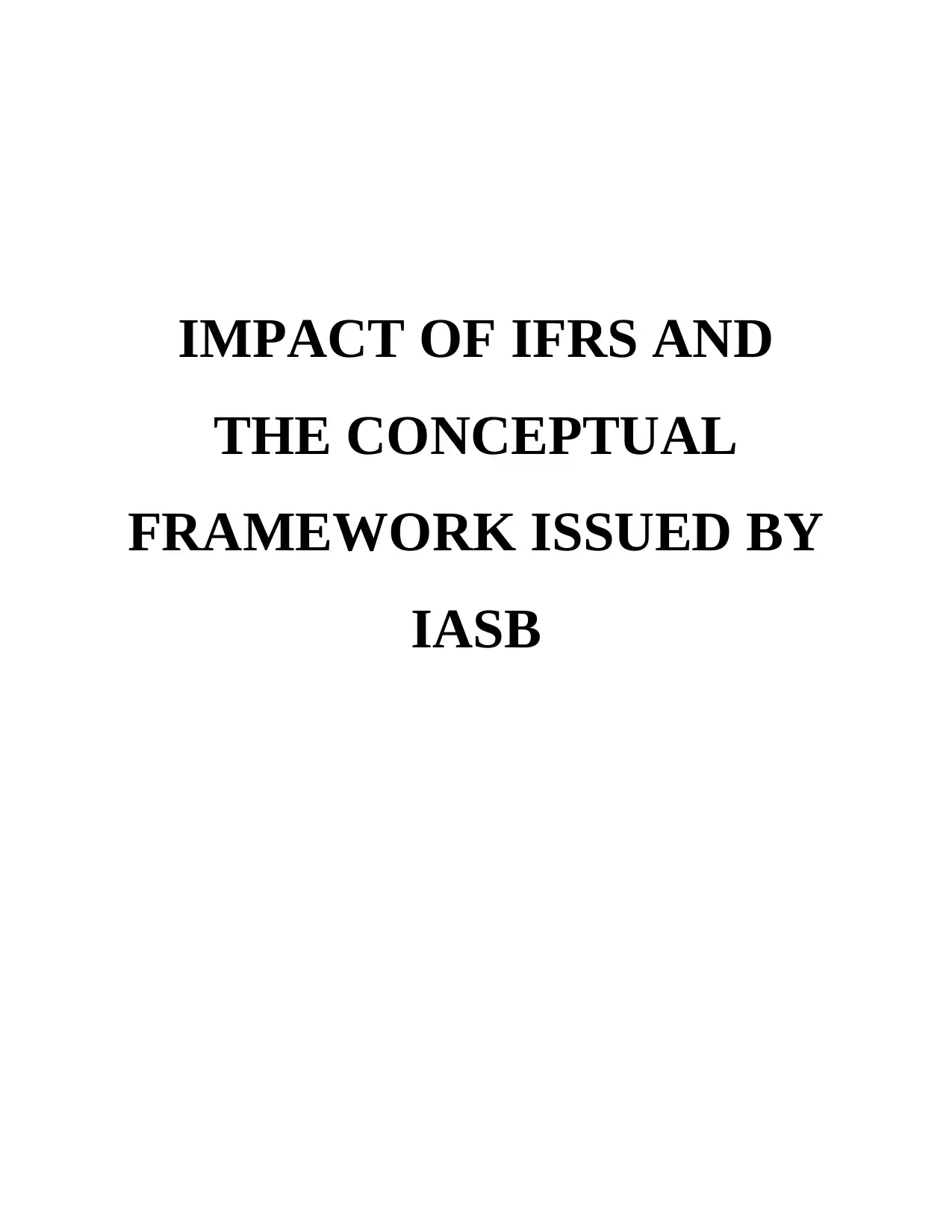
IMPACT OF IFRS AND
THE CONCEPTUAL
FRAMEWORK ISSUED BY
IASB
THE CONCEPTUAL
FRAMEWORK ISSUED BY
IASB
Paraphrase This Document
Need a fresh take? Get an instant paraphrase of this document with our AI Paraphraser
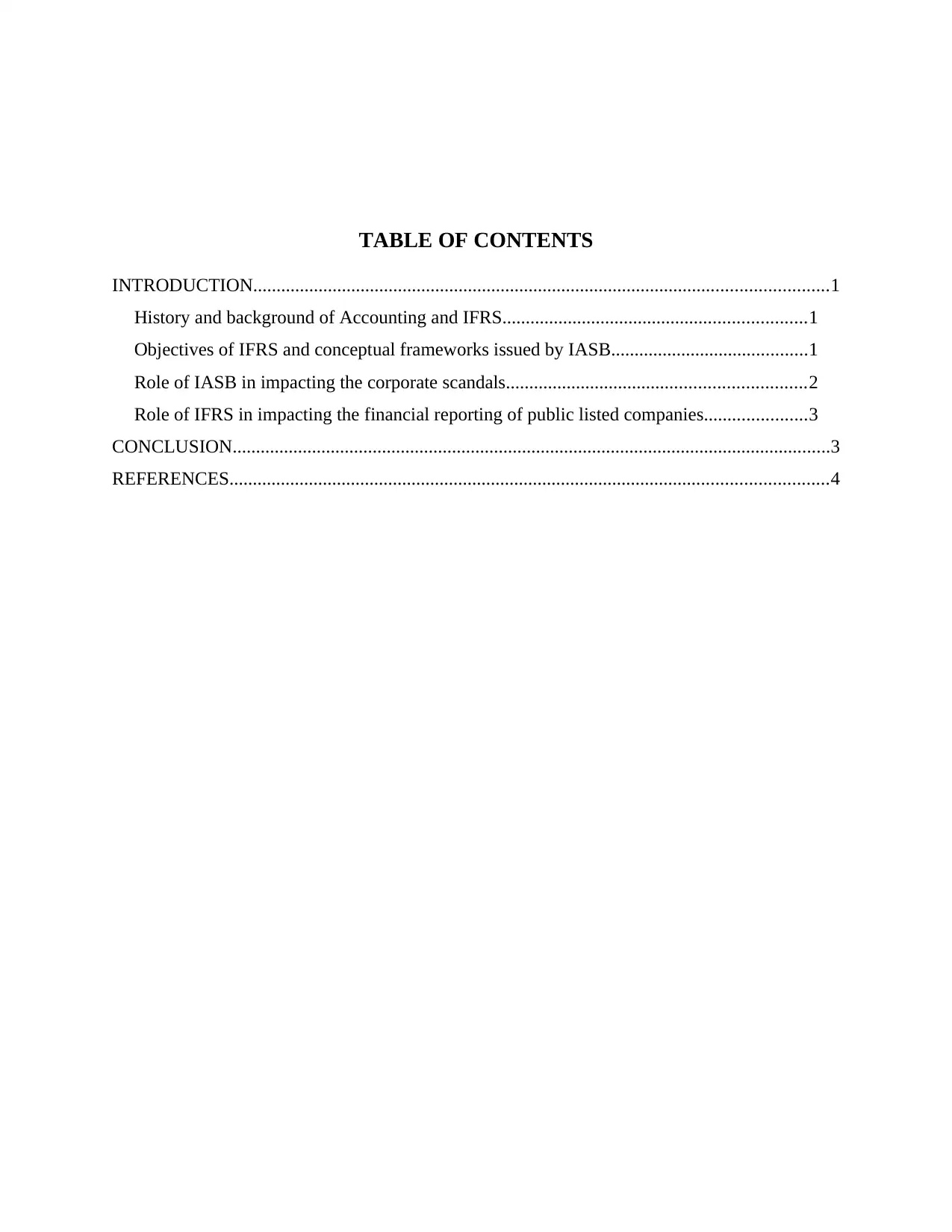
TABLE OF CONTENTS
INTRODUCTION...........................................................................................................................1
History and background of Accounting and IFRS.................................................................1
Objectives of IFRS and conceptual frameworks issued by IASB..........................................1
Role of IASB in impacting the corporate scandals................................................................2
Role of IFRS in impacting the financial reporting of public listed companies......................3
CONCLUSION................................................................................................................................3
REFERENCES................................................................................................................................4
INTRODUCTION...........................................................................................................................1
History and background of Accounting and IFRS.................................................................1
Objectives of IFRS and conceptual frameworks issued by IASB..........................................1
Role of IASB in impacting the corporate scandals................................................................2
Role of IFRS in impacting the financial reporting of public listed companies......................3
CONCLUSION................................................................................................................................3
REFERENCES................................................................................................................................4
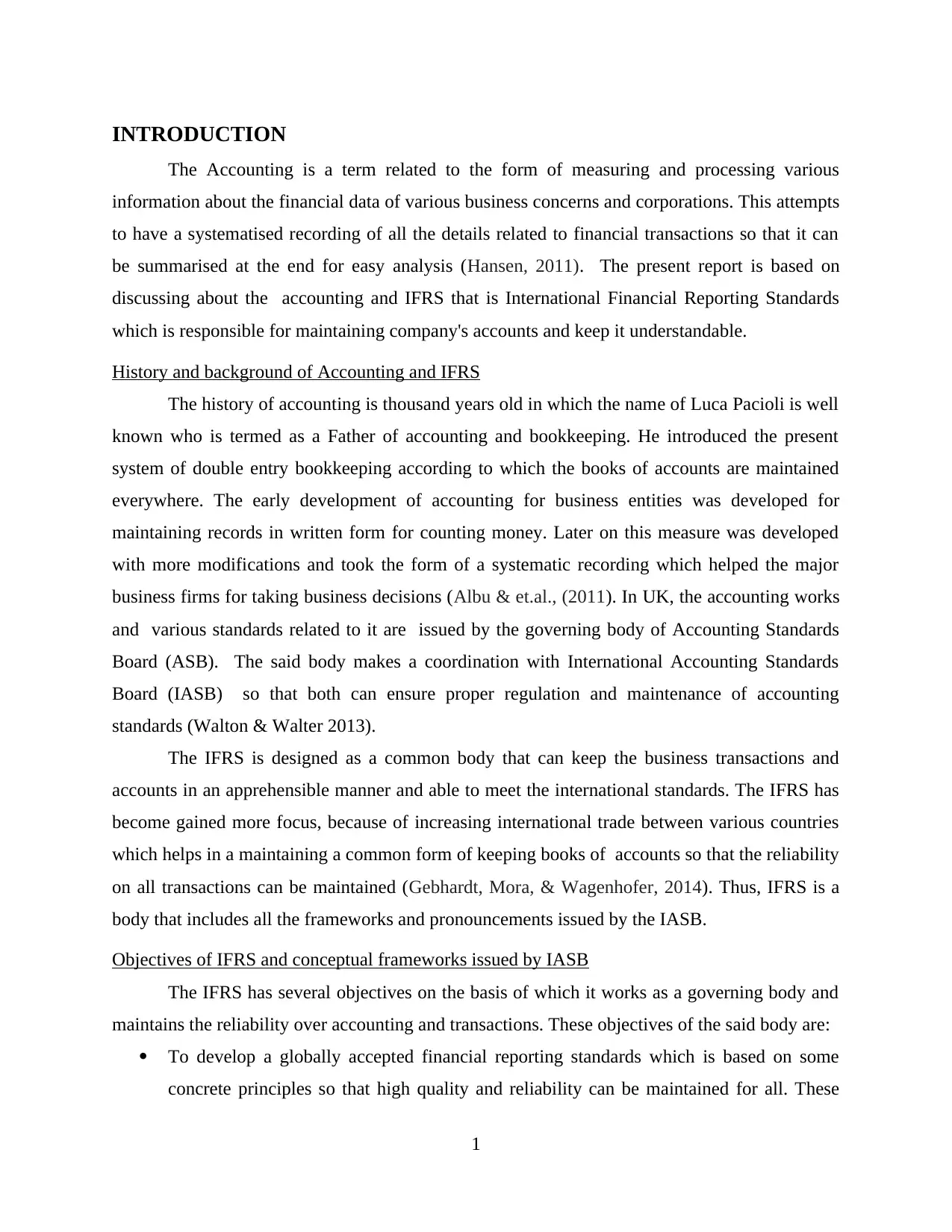
INTRODUCTION
The Accounting is a term related to the form of measuring and processing various
information about the financial data of various business concerns and corporations. This attempts
to have a systematised recording of all the details related to financial transactions so that it can
be summarised at the end for easy analysis (Hansen, 2011). The present report is based on
discussing about the accounting and IFRS that is International Financial Reporting Standards
which is responsible for maintaining company's accounts and keep it understandable.
History and background of Accounting and IFRS
The history of accounting is thousand years old in which the name of Luca Pacioli is well
known who is termed as a Father of accounting and bookkeeping. He introduced the present
system of double entry bookkeeping according to which the books of accounts are maintained
everywhere. The early development of accounting for business entities was developed for
maintaining records in written form for counting money. Later on this measure was developed
with more modifications and took the form of a systematic recording which helped the major
business firms for taking business decisions (Albu & et.al., (2011). In UK, the accounting works
and various standards related to it are issued by the governing body of Accounting Standards
Board (ASB). The said body makes a coordination with International Accounting Standards
Board (IASB) so that both can ensure proper regulation and maintenance of accounting
standards (Walton & Walter 2013).
The IFRS is designed as a common body that can keep the business transactions and
accounts in an apprehensible manner and able to meet the international standards. The IFRS has
become gained more focus, because of increasing international trade between various countries
which helps in a maintaining a common form of keeping books of accounts so that the reliability
on all transactions can be maintained (Gebhardt, Mora, & Wagenhofer, 2014). Thus, IFRS is a
body that includes all the frameworks and pronouncements issued by the IASB.
Objectives of IFRS and conceptual frameworks issued by IASB
The IFRS has several objectives on the basis of which it works as a governing body and
maintains the reliability over accounting and transactions. These objectives of the said body are:
To develop a globally accepted financial reporting standards which is based on some
concrete principles so that high quality and reliability can be maintained for all. These
1
The Accounting is a term related to the form of measuring and processing various
information about the financial data of various business concerns and corporations. This attempts
to have a systematised recording of all the details related to financial transactions so that it can
be summarised at the end for easy analysis (Hansen, 2011). The present report is based on
discussing about the accounting and IFRS that is International Financial Reporting Standards
which is responsible for maintaining company's accounts and keep it understandable.
History and background of Accounting and IFRS
The history of accounting is thousand years old in which the name of Luca Pacioli is well
known who is termed as a Father of accounting and bookkeeping. He introduced the present
system of double entry bookkeeping according to which the books of accounts are maintained
everywhere. The early development of accounting for business entities was developed for
maintaining records in written form for counting money. Later on this measure was developed
with more modifications and took the form of a systematic recording which helped the major
business firms for taking business decisions (Albu & et.al., (2011). In UK, the accounting works
and various standards related to it are issued by the governing body of Accounting Standards
Board (ASB). The said body makes a coordination with International Accounting Standards
Board (IASB) so that both can ensure proper regulation and maintenance of accounting
standards (Walton & Walter 2013).
The IFRS is designed as a common body that can keep the business transactions and
accounts in an apprehensible manner and able to meet the international standards. The IFRS has
become gained more focus, because of increasing international trade between various countries
which helps in a maintaining a common form of keeping books of accounts so that the reliability
on all transactions can be maintained (Gebhardt, Mora, & Wagenhofer, 2014). Thus, IFRS is a
body that includes all the frameworks and pronouncements issued by the IASB.
Objectives of IFRS and conceptual frameworks issued by IASB
The IFRS has several objectives on the basis of which it works as a governing body and
maintains the reliability over accounting and transactions. These objectives of the said body are:
To develop a globally accepted financial reporting standards which is based on some
concrete principles so that high quality and reliability can be maintained for all. These
1
⊘ This is a preview!⊘
Do you want full access?
Subscribe today to unlock all pages.

Trusted by 1+ million students worldwide
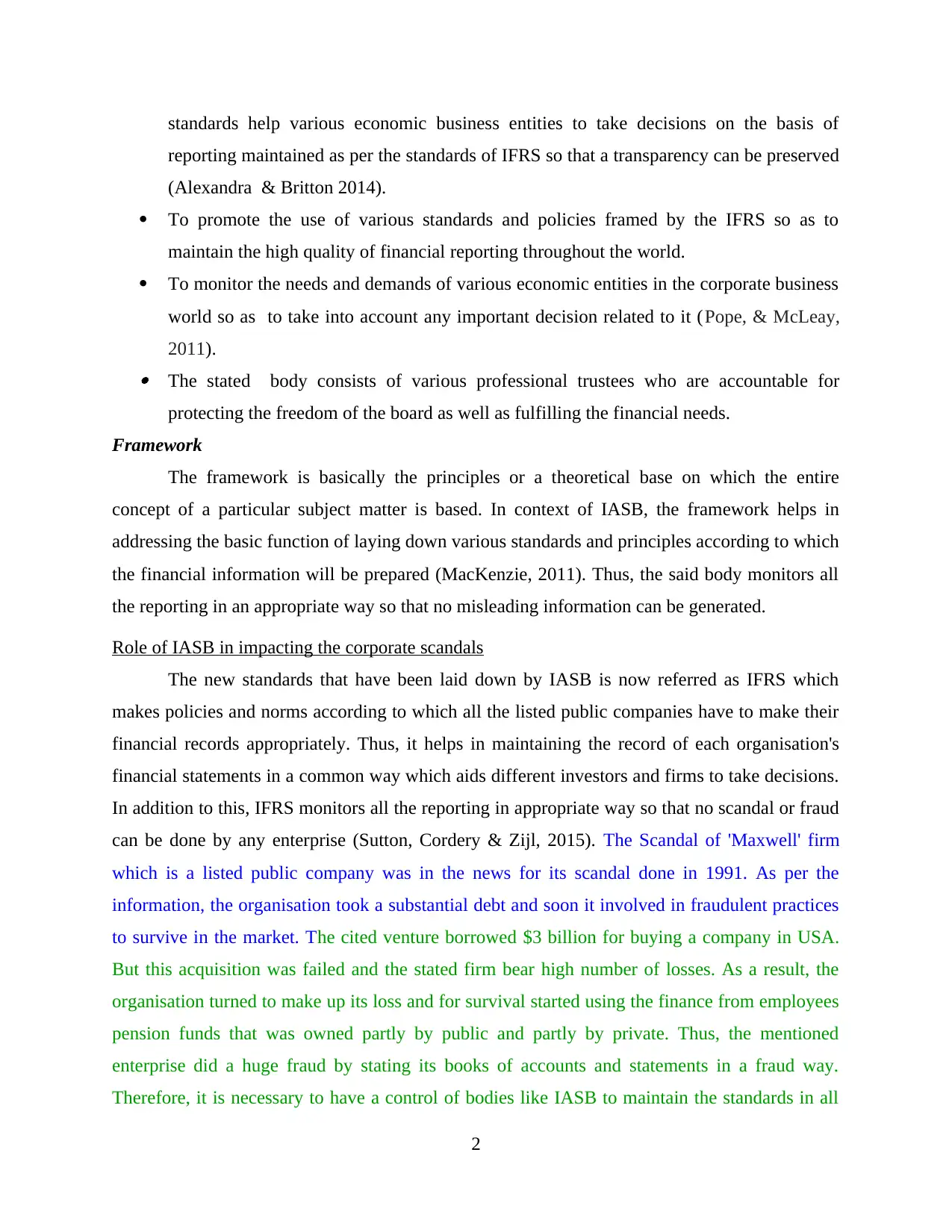
standards help various economic business entities to take decisions on the basis of
reporting maintained as per the standards of IFRS so that a transparency can be preserved
(Alexandra & Britton 2014).
To promote the use of various standards and policies framed by the IFRS so as to
maintain the high quality of financial reporting throughout the world.
To monitor the needs and demands of various economic entities in the corporate business
world so as to take into account any important decision related to it (Pope, & McLeay,
2011). The stated body consists of various professional trustees who are accountable for
protecting the freedom of the board as well as fulfilling the financial needs.
Framework
The framework is basically the principles or a theoretical base on which the entire
concept of a particular subject matter is based. In context of IASB, the framework helps in
addressing the basic function of laying down various standards and principles according to which
the financial information will be prepared (MacKenzie, 2011). Thus, the said body monitors all
the reporting in an appropriate way so that no misleading information can be generated.
Role of IASB in impacting the corporate scandals
The new standards that have been laid down by IASB is now referred as IFRS which
makes policies and norms according to which all the listed public companies have to make their
financial records appropriately. Thus, it helps in maintaining the record of each organisation's
financial statements in a common way which aids different investors and firms to take decisions.
In addition to this, IFRS monitors all the reporting in appropriate way so that no scandal or fraud
can be done by any enterprise (Sutton, Cordery & Zijl, 2015). The Scandal of 'Maxwell' firm
which is a listed public company was in the news for its scandal done in 1991. As per the
information, the organisation took a substantial debt and soon it involved in fraudulent practices
to survive in the market. The cited venture borrowed $3 billion for buying a company in USA.
But this acquisition was failed and the stated firm bear high number of losses. As a result, the
organisation turned to make up its loss and for survival started using the finance from employees
pension funds that was owned partly by public and partly by private. Thus, the mentioned
enterprise did a huge fraud by stating its books of accounts and statements in a fraud way.
Therefore, it is necessary to have a control of bodies like IASB to maintain the standards in all
2
reporting maintained as per the standards of IFRS so that a transparency can be preserved
(Alexandra & Britton 2014).
To promote the use of various standards and policies framed by the IFRS so as to
maintain the high quality of financial reporting throughout the world.
To monitor the needs and demands of various economic entities in the corporate business
world so as to take into account any important decision related to it (Pope, & McLeay,
2011). The stated body consists of various professional trustees who are accountable for
protecting the freedom of the board as well as fulfilling the financial needs.
Framework
The framework is basically the principles or a theoretical base on which the entire
concept of a particular subject matter is based. In context of IASB, the framework helps in
addressing the basic function of laying down various standards and principles according to which
the financial information will be prepared (MacKenzie, 2011). Thus, the said body monitors all
the reporting in an appropriate way so that no misleading information can be generated.
Role of IASB in impacting the corporate scandals
The new standards that have been laid down by IASB is now referred as IFRS which
makes policies and norms according to which all the listed public companies have to make their
financial records appropriately. Thus, it helps in maintaining the record of each organisation's
financial statements in a common way which aids different investors and firms to take decisions.
In addition to this, IFRS monitors all the reporting in appropriate way so that no scandal or fraud
can be done by any enterprise (Sutton, Cordery & Zijl, 2015). The Scandal of 'Maxwell' firm
which is a listed public company was in the news for its scandal done in 1991. As per the
information, the organisation took a substantial debt and soon it involved in fraudulent practices
to survive in the market. The cited venture borrowed $3 billion for buying a company in USA.
But this acquisition was failed and the stated firm bear high number of losses. As a result, the
organisation turned to make up its loss and for survival started using the finance from employees
pension funds that was owned partly by public and partly by private. Thus, the mentioned
enterprise did a huge fraud by stating its books of accounts and statements in a fraud way.
Therefore, it is necessary to have a control of bodies like IASB to maintain the standards in all
2
Paraphrase This Document
Need a fresh take? Get an instant paraphrase of this document with our AI Paraphraser
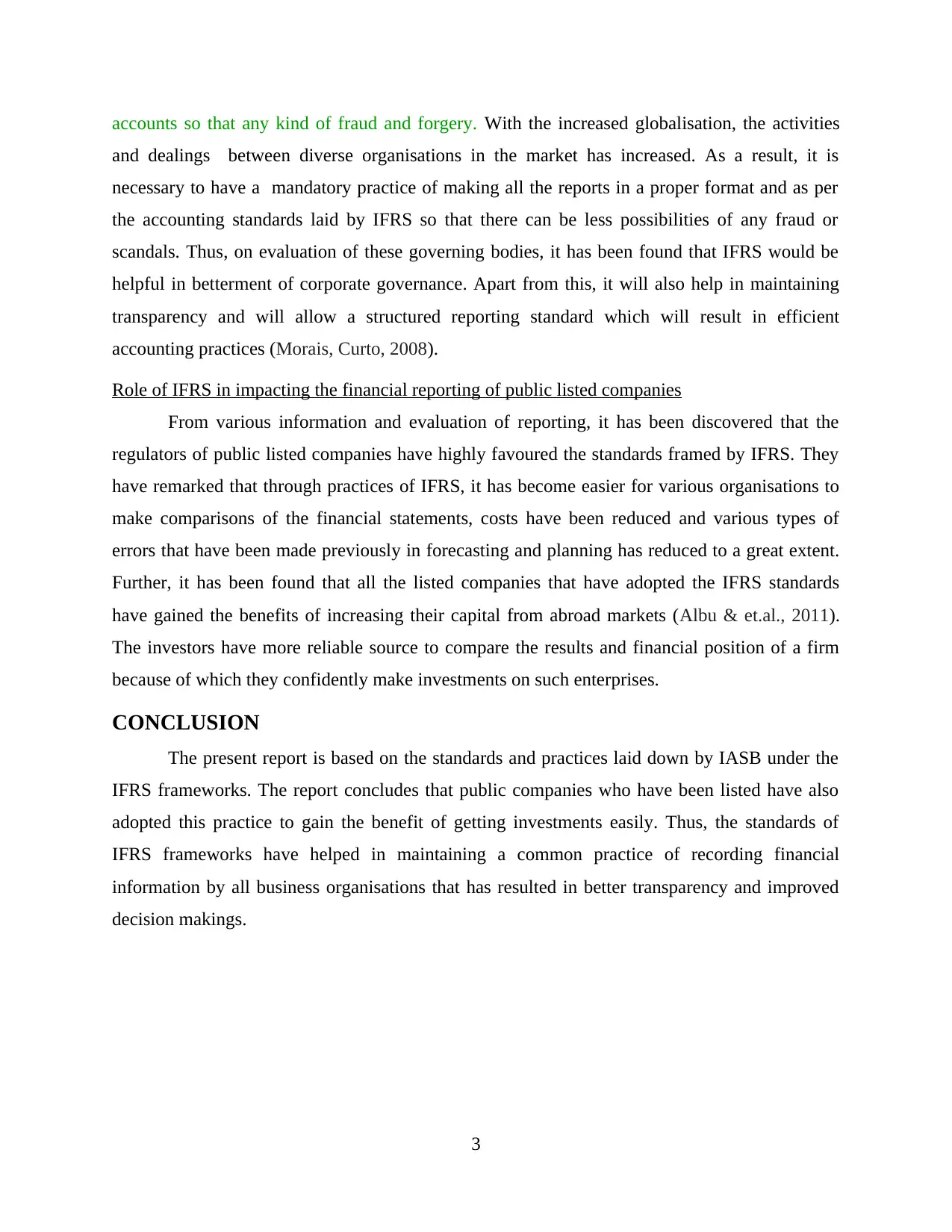
accounts so that any kind of fraud and forgery. With the increased globalisation, the activities
and dealings between diverse organisations in the market has increased. As a result, it is
necessary to have a mandatory practice of making all the reports in a proper format and as per
the accounting standards laid by IFRS so that there can be less possibilities of any fraud or
scandals. Thus, on evaluation of these governing bodies, it has been found that IFRS would be
helpful in betterment of corporate governance. Apart from this, it will also help in maintaining
transparency and will allow a structured reporting standard which will result in efficient
accounting practices (Morais, Curto, 2008).
Role of IFRS in impacting the financial reporting of public listed companies
From various information and evaluation of reporting, it has been discovered that the
regulators of public listed companies have highly favoured the standards framed by IFRS. They
have remarked that through practices of IFRS, it has become easier for various organisations to
make comparisons of the financial statements, costs have been reduced and various types of
errors that have been made previously in forecasting and planning has reduced to a great extent.
Further, it has been found that all the listed companies that have adopted the IFRS standards
have gained the benefits of increasing their capital from abroad markets (Albu & et.al., 2011).
The investors have more reliable source to compare the results and financial position of a firm
because of which they confidently make investments on such enterprises.
CONCLUSION
The present report is based on the standards and practices laid down by IASB under the
IFRS frameworks. The report concludes that public companies who have been listed have also
adopted this practice to gain the benefit of getting investments easily. Thus, the standards of
IFRS frameworks have helped in maintaining a common practice of recording financial
information by all business organisations that has resulted in better transparency and improved
decision makings.
3
and dealings between diverse organisations in the market has increased. As a result, it is
necessary to have a mandatory practice of making all the reports in a proper format and as per
the accounting standards laid by IFRS so that there can be less possibilities of any fraud or
scandals. Thus, on evaluation of these governing bodies, it has been found that IFRS would be
helpful in betterment of corporate governance. Apart from this, it will also help in maintaining
transparency and will allow a structured reporting standard which will result in efficient
accounting practices (Morais, Curto, 2008).
Role of IFRS in impacting the financial reporting of public listed companies
From various information and evaluation of reporting, it has been discovered that the
regulators of public listed companies have highly favoured the standards framed by IFRS. They
have remarked that through practices of IFRS, it has become easier for various organisations to
make comparisons of the financial statements, costs have been reduced and various types of
errors that have been made previously in forecasting and planning has reduced to a great extent.
Further, it has been found that all the listed companies that have adopted the IFRS standards
have gained the benefits of increasing their capital from abroad markets (Albu & et.al., 2011).
The investors have more reliable source to compare the results and financial position of a firm
because of which they confidently make investments on such enterprises.
CONCLUSION
The present report is based on the standards and practices laid down by IASB under the
IFRS frameworks. The report concludes that public companies who have been listed have also
adopted this practice to gain the benefit of getting investments easily. Thus, the standards of
IFRS frameworks have helped in maintaining a common practice of recording financial
information by all business organisations that has resulted in better transparency and improved
decision makings.
3
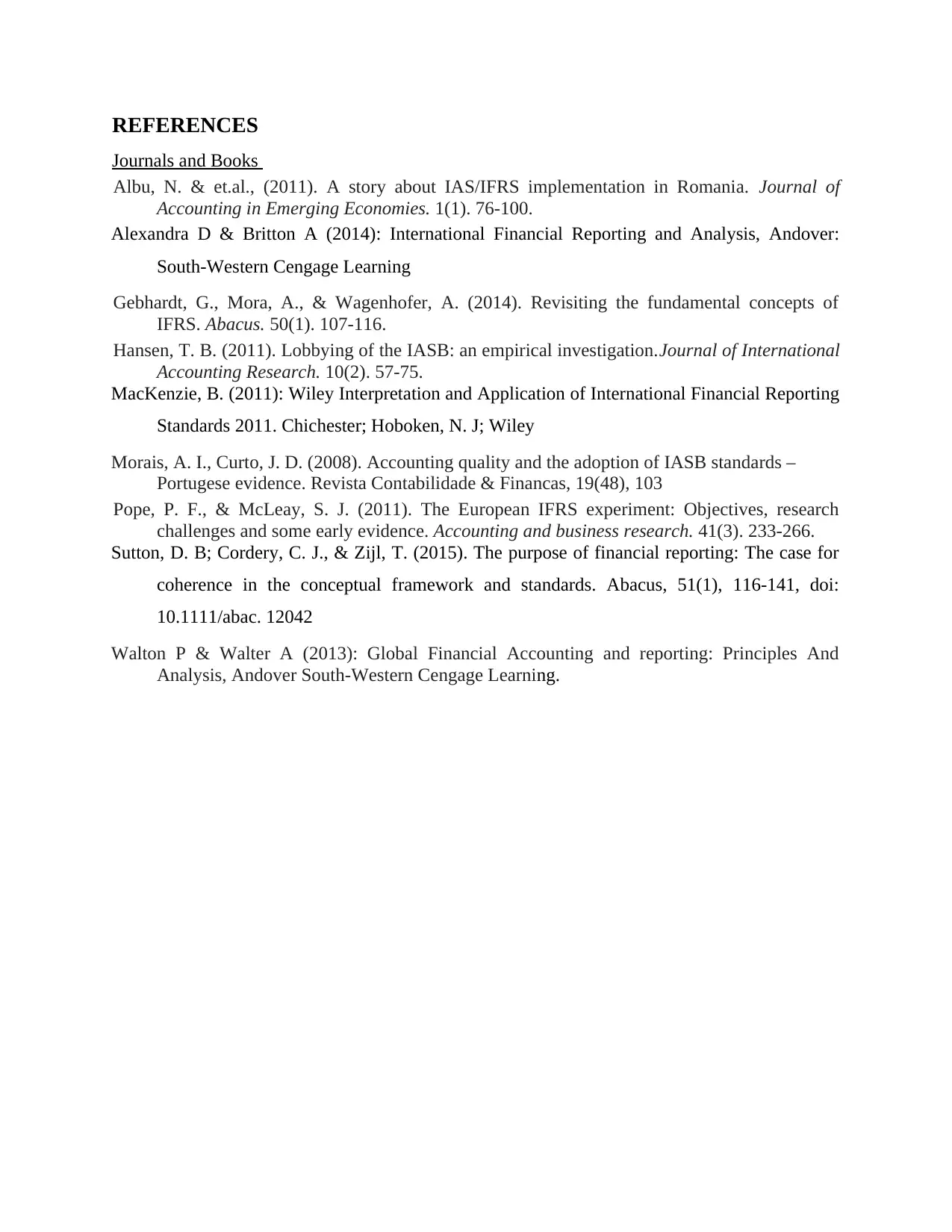
REFERENCES
Journals and Books
Albu, N. & et.al., (2011). A story about IAS/IFRS implementation in Romania. Journal of
Accounting in Emerging Economies. 1(1). 76-100.
Alexandra D & Britton A (2014): International Financial Reporting and Analysis, Andover:
South-Western Cengage Learning
Gebhardt, G., Mora, A., & Wagenhofer, A. (2014). Revisiting the fundamental concepts of
IFRS. Abacus. 50(1). 107-116.
Hansen, T. B. (2011). Lobbying of the IASB: an empirical investigation.Journal of International
Accounting Research. 10(2). 57-75.
MacKenzie, B. (2011): Wiley Interpretation and Application of International Financial Reporting
Standards 2011. Chichester; Hoboken, N. J; Wiley
Morais, A. I., Curto, J. D. (2008). Accounting quality and the adoption of IASB standards –
Portugese evidence. Revista Contabilidade & Financas, 19(48), 103
Pope, P. F., & McLeay, S. J. (2011). The European IFRS experiment: Objectives, research
challenges and some early evidence. Accounting and business research. 41(3). 233-266.
Sutton, D. B; Cordery, C. J., & Zijl, T. (2015). The purpose of financial reporting: The case for
coherence in the conceptual framework and standards. Abacus, 51(1), 116-141, doi:
10.1111/abac. 12042
Walton P & Walter A (2013): Global Financial Accounting and reporting: Principles And
Analysis, Andover South-Western Cengage Learning.
Journals and Books
Albu, N. & et.al., (2011). A story about IAS/IFRS implementation in Romania. Journal of
Accounting in Emerging Economies. 1(1). 76-100.
Alexandra D & Britton A (2014): International Financial Reporting and Analysis, Andover:
South-Western Cengage Learning
Gebhardt, G., Mora, A., & Wagenhofer, A. (2014). Revisiting the fundamental concepts of
IFRS. Abacus. 50(1). 107-116.
Hansen, T. B. (2011). Lobbying of the IASB: an empirical investigation.Journal of International
Accounting Research. 10(2). 57-75.
MacKenzie, B. (2011): Wiley Interpretation and Application of International Financial Reporting
Standards 2011. Chichester; Hoboken, N. J; Wiley
Morais, A. I., Curto, J. D. (2008). Accounting quality and the adoption of IASB standards –
Portugese evidence. Revista Contabilidade & Financas, 19(48), 103
Pope, P. F., & McLeay, S. J. (2011). The European IFRS experiment: Objectives, research
challenges and some early evidence. Accounting and business research. 41(3). 233-266.
Sutton, D. B; Cordery, C. J., & Zijl, T. (2015). The purpose of financial reporting: The case for
coherence in the conceptual framework and standards. Abacus, 51(1), 116-141, doi:
10.1111/abac. 12042
Walton P & Walter A (2013): Global Financial Accounting and reporting: Principles And
Analysis, Andover South-Western Cengage Learning.
⊘ This is a preview!⊘
Do you want full access?
Subscribe today to unlock all pages.

Trusted by 1+ million students worldwide
1 out of 6
Related Documents
Your All-in-One AI-Powered Toolkit for Academic Success.
+13062052269
info@desklib.com
Available 24*7 on WhatsApp / Email
![[object Object]](/_next/static/media/star-bottom.7253800d.svg)
Unlock your academic potential
Copyright © 2020–2026 A2Z Services. All Rights Reserved. Developed and managed by ZUCOL.



